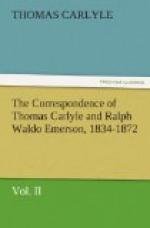—T. Carlyle
CLI. Emerson to Carlyle
Concord, 19 April, 1853
My Dear Friend,—As I find I never write a letter except at the dunning of the Penny Post,—which is the pest of the century,—I have thought lately of crossing to England to excuse to you my negligence of your injunction, which so flattered me by its affectionateness a year ago. I was to write once a month. My own disobedience is wonderful, and explains to me all the sins of omission of the whole world. The levity with which we can let fall into disuse such a sacrament as the exchange of greeting at short periods, is a kind of magnanimity, and should be an astonishing argument of the “Immortality”; and I wonder how it has escaped the notice of philosophers. But what had I, dear wise man, to tell you? What, but that life was still tolerable; still absurdly sweet; still promising, promising, to credulous idleness;—but step of mine taken in a true direction, or clear solution of any the least secret,—none whatever. I scribble always a little,—much less than formerly,—and I did within a year or eighteen months write a chapter on Fate, which—if we all live long enough, that is, you, and I, and the chapter—I hope to send you in fair print. Comfort yourself—as you will—you will survive the reading, and will be a sure proof that the nut is not cracked. For when we find out what Fate is, I suppose, the Sphinx and we are done for; and Sphinx, Oedipus, and world ought, by good rights, to roll down the steep into the sea.
But I was going to say, my neglect of your request will show you how little saliency is in my weeks and months. They are hardly distinguished in memory other than as a running web out of a loom, a bright stripe for day, a dark stripe for night, and, when it goes faster, even these run together into endless gray... I went lately to St. Louis and saw the Mississippi again. The powers of the River, the insatiate craving for nations of men to reap and cure its harvests, the conditions it imposes,—for it yields to no engineering,—are interesting enough. The Prairie exists to yield the greatest possible quantity of adipocere. For corn makes pig, pig is the export of all the land, and you shall see the instant dependence of aristocracy and civility on the fat four legs. Workingmen, ability to do the work of the River, abounded. Nothing higher was to be thought of. America is incomplete. Room for us all, since it has not ended, nor given sign of ending, in bard or hero. ’T is a wild democracy, the riot of mediocrities, and none of your selfish Italies and Englands, where an age sublimates into a genius, and the whole population is made into Paddies to feed his porcelain veins, by transfusion from their brick arteries. Our few fine persons are apt to die. Horatio Greenough, a sculptor, whose tongue was far cunninger in talk than his chisel to carve, and who inspired great hopes,




